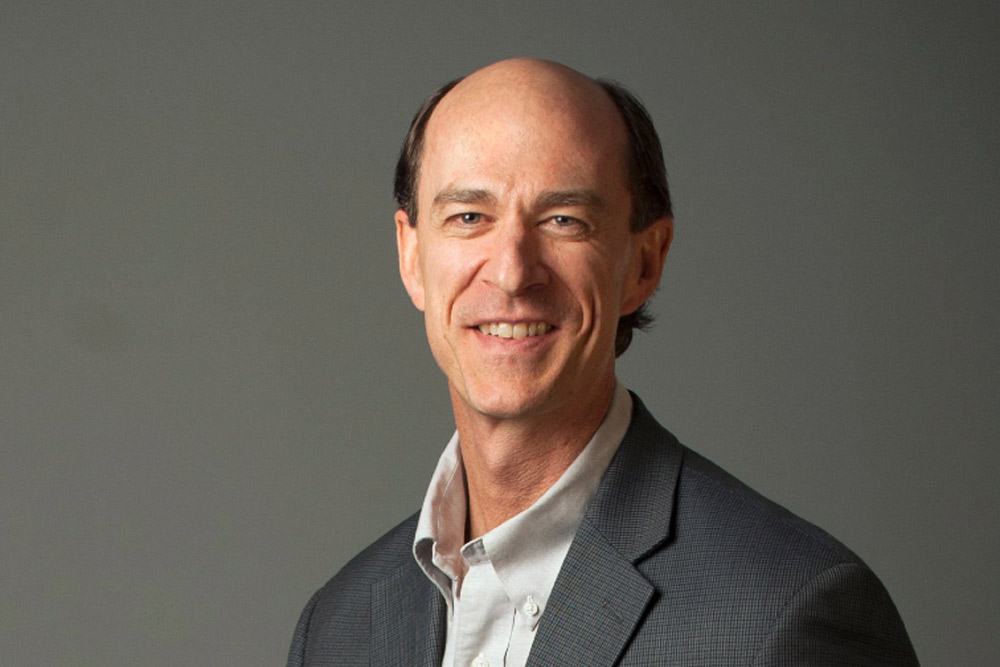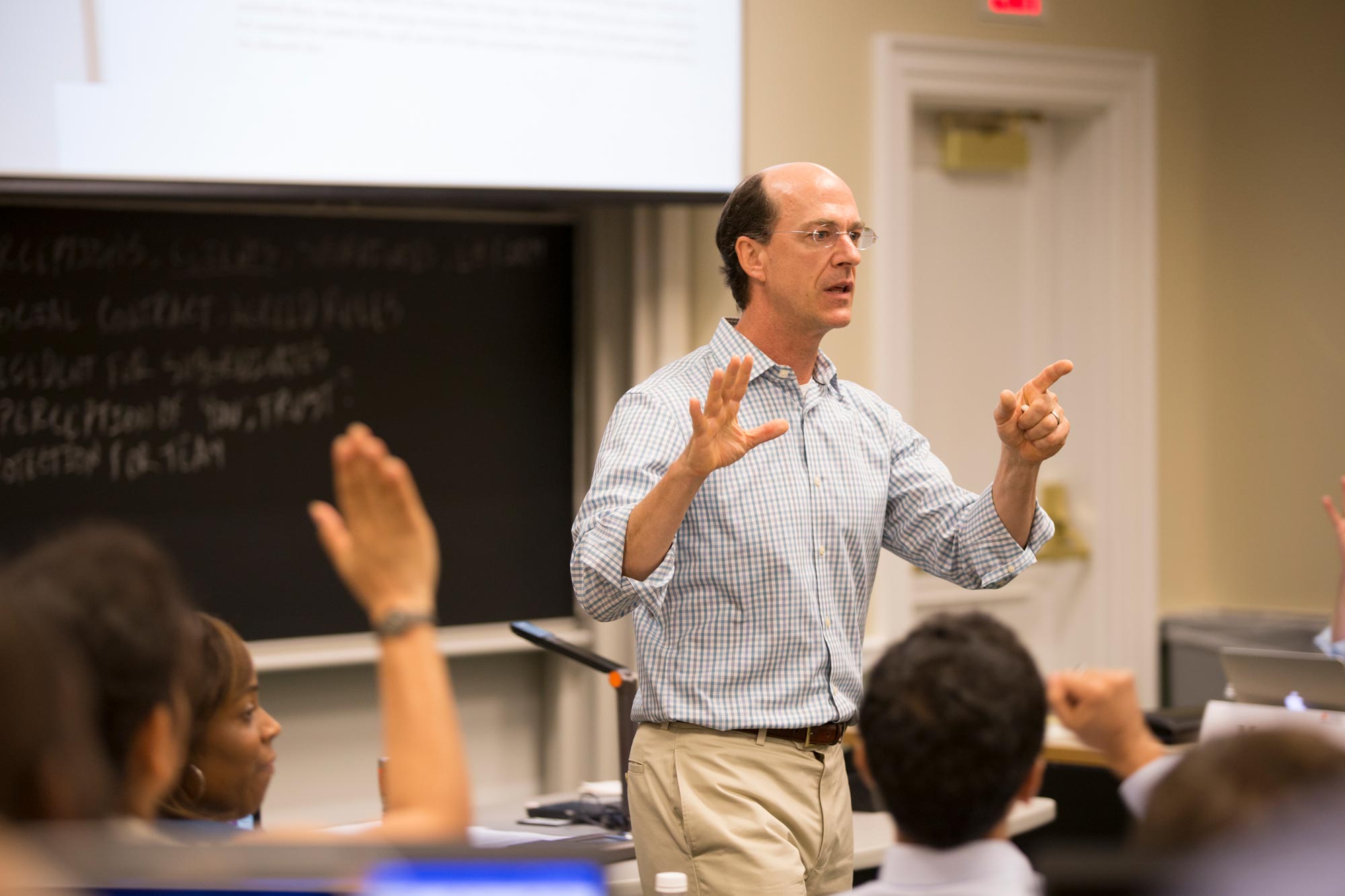For Andy Wicks, thinking about life’s big questions is a part of his identity and a part of his legacy.
Wicks, a business ethics professor at the University of Virginia’s Darden School of Business, has written his new book, “Ultimate Questions,” to explore issues at the core of human experience. The book, set for publication this summer, is based in part on the course he has taught at the Darden School and tackles four fundamental questions: Who are we? Why are we here? What does it mean to live a good life? How should we get along with others?
Those questions have taken on even greater significance for Wicks, as a progressing neurodegenerative disease has forced the 61-year-old to confront them on profoundly personal terms. “I am staring squarely at my own mortality,” he writes in the book’s preface.
“It is very fitting that this will be my last book and my last major publication,” Wicks said in a recent interview facilitated by his wife, Cathy. “It has been a tremendous joy. I didn’t understand it when I started, but it is clear to me now that this was the thing that I was put on Earth to do – not necessarily just to write this specific book, but to be invested in, and articulate, this path, this way of engaging with life, this way of living these questions.”
Wicks, the Ruffin Professor of Business Administration and Richard M. Waitzer Bicentennial Professor of Ethics, said he was “wired” for thinking about questions in a deep way. As a young boy, he would sit up at night, struggling with questions such as “Does God exist?” – a curiosity that led him to pursue a master’s degree and doctorate in religious ethics at UVA.
One of Wicks’ earliest heroes was the classical Greek philosopher, Socrates.
In Plato’s “Apology,” Socrates claims, “the unexamined life is not worth living.” That phrase served as Wicks’ North Star for his career and life.

Wicks, the Ruffin Professor of Business Administration and Richard M. Waitzer Bicentennial Professor of Ethics, says as a child, he would be up at night, struggling with questions such as “Does God exist?” (Contributed photo)
“When I submitted my packet for promotion to full professor, I built it around this idea that a well-lived life is one where you are willing to ask questions, to be aware, to be conscious, rather than to be deluded through life and float on a cloud and never ask hard questions,” Wicks said.
Wicks was headed toward a career in medical, religious or philosophical ethics until he met University Professor Ed Freeman, the Elis and Signe Olsson Professor of Business Administration at the Darden School, who opened Wicks’ eyes to what business ethics is about.
“Andy is absolutely one of my closest colleagues, and I’m very proud to say that he was one of my best-ever Ph.D. students,” Freeman said. “Andy lives his life with integrity and grace, and the book reflects that. It’s like having a conversation with Andy.”
After graduating, Wicks taught for a decade at the University of Washington before Freeman helped recruit him to the Darden School in 2002. The pair went on to write three books together, in addition to several papers.
Wicks was relaxing on a beach in Hawaii with Cathy, celebrating their anniversary, when, “like a bolt of lightning,” the outline for his latest book struck him. Within half an hour, he had sketched out what would become “Ultimate Questions.”
In the Darden School classroom, Wicks explored the questions through his course, Ultimate Questions and Creating Value for Stakeholders.
“The questions are so fundamental and so inescapable that they really reside at the foundation of a lot of other questions we wrestle with in life,” Wicks said. “No matter how we live our lives, these questions are there for us. The only issue is: Are we going to pay attention?”
While deep conversations may feel uncomfortable at first, Wicks believes they’re essential.
“Through the process of conversation, we come to a richer understanding of the questions, and build stronger, more resilient relationships,” he said.

As a professor at UVA’s Darden School of Business, Wicks explores the four fundamental questions in his course, Ultimate Questions and Creating Value for Stakeholders. (Contributed photo)
“These questions apply to all of humanity, all the time,” said Wicks. “We are all answering those questions, even if we’re not sitting down and consciously thinking about them. Part of what makes these questions special is that they are unavoidable.”
Wicks stresses the book is not about providing answers, but about asking better questions and choosing to “live them” intentionally, to believe while retaining humility and being open to new ideas, beliefs and experiences.
“This book has been a version of me living my questions,” said Wicks, who sees parallels between human experience and Homer’s “Odyssey.”
“In a sense, like in the ‘Odyssey,’ I’m returning to where I started,” he said. “Now that I am facing the end of my own life, it has been therapeutic for me to dig deeply into what I want to say and share with an audience. It has also helped clarify what’s important to me and helped make me accountable to myself.”










